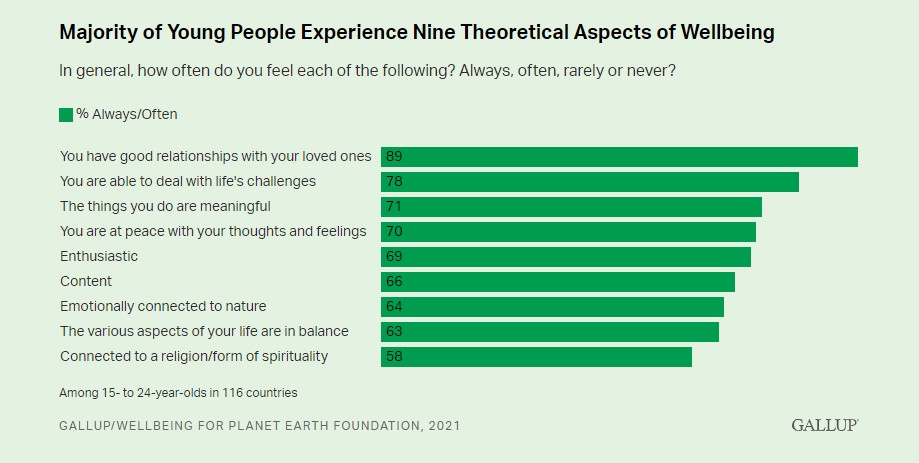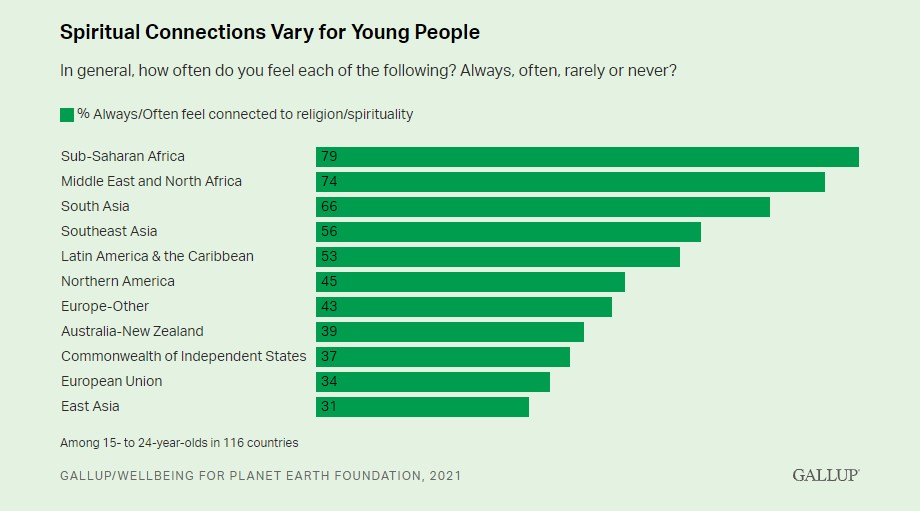Good Relationships Are a Constant in Young People’s Lives (Gallup)

By Telli Davoodi and Alden Lai
Young people’s experiences — and their wellbeing — play a crucial role in whether they achieve what they hope to in life. But how do you measure each of these to get a more complete picture of young people’s lives?
In an ongoing partnership, Gallup and the Wellbeing for Planet Earth Foundation are investigating aspects of people’s wellbeing that have not been globally tracked before, including their connections to others, nature, religion and spirituality, and their feelings of balance, peace, competency, and contentment in life.
The findings from the study paint a more holistic and culturally relevant picture of the wellbeing of young people between the ages of 15 and 24 around the globe than traditional economic measures and other objective indicators alone can provide.
Key Findings
Across 116 countries in 2021, majorities of 15- to 24-year-olds report “always” or “often” experiencing each of the nine aspects of wellbeing they were asked about.
The strongest majorities of young people reported feeling that they have good relationships with their loved ones (89%) and that they are able to deal with life’s challenges (78%). These findings are important because positive relationships can form safety nets that empower young people as they navigate the world. Feelings of empowerment can, in turn, shape young people’s experiences with the world because such feelings may enable them to approach challenges with more confidence and agency.
Other experiences, such as feeling connected to nature or to a religion or spirituality, may also contribute to wellbeing by providing meaning and purpose in life. Nearly two in three (64%) 15- to 24-year-olds report feeling emotionally connected to nature, while a slightly smaller percentage (58%) report experiencing connection to religion or a form of spirituality.
For young people, feelings such as enthusiasm may be more indicative of a happy and productive life. Across the world, 69% of 15- to 24-year-olds report feeling enthusiastic. However, peace with one’s own thoughts and feelings may also help young people focus on their goals and aspirations. In fact, just as many young people, 70%, report feeling at peace with their own thoughts and feelings.

Subjective wellbeing looks different in different parts of the world, although good relationships are the most prevalent experience in most regions.
Across most regions of the world, the most commonly reported experience among young people is that they have good relationships with their loved ones (87% or higher in almost all regions). The only exception is Northern America, where the most commonly reported experience is being able to deal with life’s challenges (89%), followed closely by experiencing enthusiasm (87%) and then good relationships (85%).
Despite similar trends across most regions of the world in young people’s most common experience, the prevalence of other specific facets of their subjective wellbeing varies, depending on socioeconomic conditions and cultural norms.
For example, in most regions of the world, young people are least likely to say they frequently feel connected to religion or spirituality. However, in the Middle East and North Africa, as well as in sub-Saharan Africa, connection to religion or spirituality is among the most commonly reported experiences for young people (after good relationships).
In South Asia, connection to religion or spirituality is in the middle, between the top experiences (good relationships, competency, peace, connection to nature) and the least-common experiences (content, balance, meaning, enthusiasm).

Implications
Given the interplay between various subjective and objective factors in wellbeing, it is especially important to understand what wellbeing looks like for young people around the world, because their wellbeing shapes their future and the future of societies.
The data from this study reveal more of the picture of what life looks like for young people, complete with cultural nuances as well as universal patterns. Insights from these data may translate into actionable solutions for promoting holistic and culturally reflective wellbeing for young people.
Authors
Dr. Telli Davoodi is a senior social science researcher at Gallup.
Dr. Alden Lai serves as executive adviser to the Wellbeing for Planet Earth Foundation and the WPE lead for the Global Wellbeing Initiative. Lai is also an assistant professor of public health policy and management at the School of Global Public Health and affiliated faculty at the Stern School of Business, New York University.
Tagged
Related Insights
Discover what our researchers and industry experts are saying about wellbeing.
See More Insights